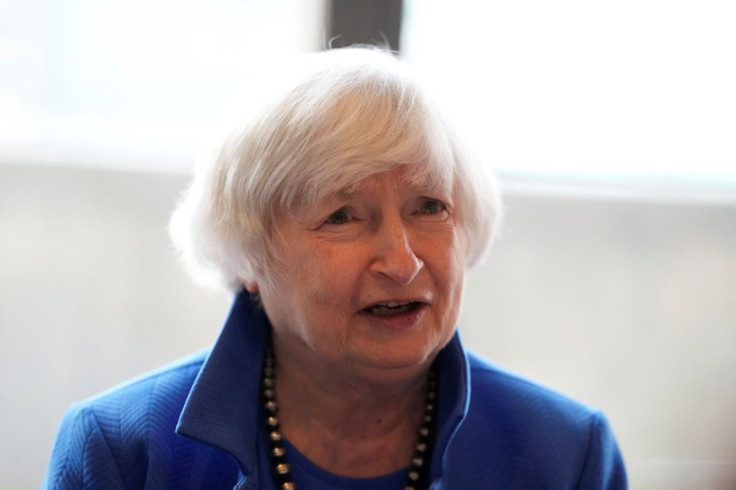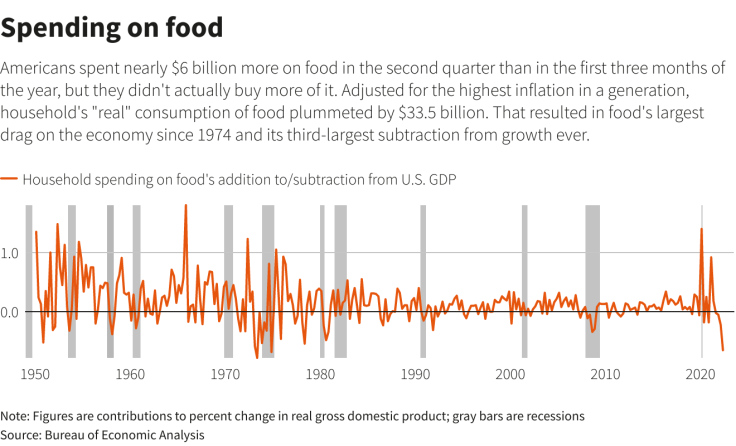U.S. GDP Contraction Puts Yellen In Tight Spot As Economic Cheerleader

The U.S. economy's contraction for a second consecutive quarter will make it more difficult for Treasury Secretary Janet Yellen to portray an image of economic health at a news conference later on Thursday.
The Commerce Department reported earlier on Thursday that U.S. gross domestic product shrank 0.9% in the second quarter. The drop, coming on top of a 1.6% contraction in the first quarter, quickly fueled debate among economists and politicians as to whether the United States is or soon will be in recession.
Yellen is due to hold a news conference at 1:30 p.m. EDT (1730 GMT) at which she is expected to stay firmly in the "not a recession" camp. She has been saying in recent weeks that the traditional short-hand definition of a recession - two consecutive quarters of GDP contraction - does not apply in this case, largely because of a strong U.S. job market.
A Treasury media advisory on Tuesday said Yellen in brief remarks "will underscore America's historic recovery over the last 18 months from the depths of the pandemic, with over nine million jobs created, the biggest single-year decline in unemployment on record, and the fastest year of economic growth in 2021 in almost four decades."
Yellen also will highlight global challenges to the U.S. economy, including inflation driven by the war in Ukraine and ongoing pandemic-related supply disruptions, the advisory said, and discuss "the resilience of America's workers, businesses and economy in the face of these international headwinds."
The Treasury chief last year had argued that inflation would be "transitory," receding as supply-chain disruptions eased. But inflation has proven more persistent - consumer prices rose at a 9.1% annual pace in June - and she admitted in late May that she was "wrong" about the path inflation would take.
FOOD INFLATION
The argument that the United States may be able to escape recession as the Federal Reserve tightens monetary policy to bring inflation back down to the central bank's 2% target may be harder to make amid signs that consumer spending and the housing market are slowing precipitously.
Thursday's GDP report showed consumer spending grew just 1% last quarter, down sharply from 1.8% in the prior period. Residential investment plunged at a rate of 14% - the biggest housing drag on GDP in 14 years.
Retail giant Walmart on Monday warned that it would have to slash prices to clear bloated inventories as high food and gasoline costs were prompting consumers to cut back discretionary spending.
Indeed, food inflation was a major drag on second-quarter GDP. While nominal spending on food for consumption at home was up by $5.9 billion, Americans' "real" food consumption adjusted for the highest inflation in four decades tumbled by $33.5 billion from a quarter earlier, creating its largest drag on the economy in nearly half a century.
Spending on food:

Reacting to the data, some economists and market analysts were already starting to declare a "technical" recession.
"These are disappointing numbers, obviously, and the first quarter was revised lower," said Peter Cardillo, chief market economist at Spartan Capital Securities in New York. "The market has been forecasting a recession. From a textbook viewpoint, this is a recession and a mild one."
Art Hogan, chief market strategist at B. Riley Wealth Management in New York, said it was "easy to get caught up in the semantics" over recession terminology, but the economy feels weak.
"I think the economy feels the way it feels to you, and if you feel like the economy is lousy because you know you're being pinched by higher prices then you know you're in a recession. Just the word 'recession' means that we're receding and economic growth is obviously receding."
© Copyright Thomson Reuters 2024. All rights reserved.











